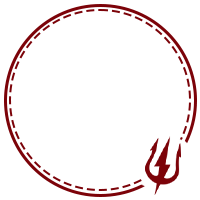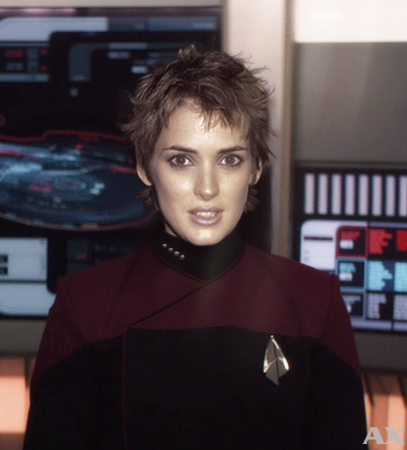The away team stood in a cathedral-sized hall, ovular, with several colossal doorways branching off in every direction. Each one bore another monolithic door carved with the same haunting deity, now shown with arms outstretched, palms upturned, as if waiting. Dust drifted lazily through the shaft of light in the center of the room, and the silence of their surroundings felt immense.
“Seven,” Lieutenant Junior Grade Irovin murmured. “Seven doors.”
“Each one sealed,” T’Luni confirmed, “But the stone resonates differently at each. Composition variance of several percent. The purpose remains unclear.”
Lieutenant Commander Cruikshank turned slowly on the spot, taking it all in. “Maybe each one leads to a different section of the complex. Or maybe –”
A dull thud echoed through the hall. The team froze.
There was silence, and for a moment, nothing happened. Then, still as if responding to their presence, the door on the farthest left began to shift. A hairline seam appeared in the door’s pristine surface, releasing a line of dust into the air.
Irovin stepped back reflexively. “Sir…”
“I see it,” Cruikshank replied, his eyes fixed on the seam. The crack widened just enough for a faint beam of that same impossible light to spill through. Cruikshank swallowed hard, then spoke in a low voice. “Alright, team. Let’s mark this location. We’ll use it as a base of operations for now.”
He tapped his commbadge. “Away Team to Lief Erikson, reporting in.”
There was a hiss of static before the reply came through. “This is the Lief Erikson. Go ahead, Commander.”
“I’m sending coordinates now,” he said, “Please send us down the mission equipment. We’re going to set up our home base here.”
“Affirmative, Commander. Sending supplies down now.”
By the time the last crate had shimmered onto the floor, the air in the cavern had settled again. Cruikshank stood beside it as it took form. “There we go,” he said, checking his PADD, “A three-day supply of rations, plus all our mission gear.”
“Sir,” Irovin interjected, kneeling to open a crate, “If we could have just transported to the surface in the first place, why did we take a shuttle?”
“Because, Lieutenant,” he said with a wink, “Flying is more fun.”
Irovin unsnapped the lid on the crate and lifted it, peering inside. She was hit with the warm smell of roasted coffee beans and began frantically digging in the crate until she lifted out a square-bottomed foil bag.
“Bless that quartermaster.” She said, smiling, “He sent the good coffee.”
“Try not to use it all on the first night,” Cruikshank said dryly.
They had set up their camp near the central light shaft, where the golden beam cut straight down from the ceiling to the stone floor. The light didn’t waver or shift as the hours passed, and it gave enough illumination that they didn’t need their lanterns.
T’Luni had busied herself by setting up a portable light stand near one of the monolithic stone doors and taking a closer look at it. “These reliefs are consistent with the ones seen at the surface,” she said, scanning the door with her tricorder. “However, the precision of the carving improves markedly at this depth. It would appear that the craftsman’s skills increased as they descended.”
“Or…” Irovin said, “The people who built the exterior door weren’t the same as the ones who built the complex itself.”
“Good observation, Lieutenant,” Cruikshank responded. “That is a distinct possibility.”
Irovin began taking scans of the central light shaft, crouching at the base where the bright pillar met the stone floor. She ran her tricorder along the light’s edge. “This is incredible. There is no discernible energy source or radiation, but the beam registers as solar-spectrum light. The temperature is consistent with late afternoon sunlight, but there’s no heat source.” She stood slowly. “The light behaves exactly like sunlight, but it’s not. It could be a projection.”
“Projection from where?” Cruikshank asked.
“That,” she said, closing her tricorder, “is the troubling part.”
A distant sound echoed from behind one of the sealed doors: a soft scraping sound, like stone on stone. The away team turned towards the sound in unison, shining lights in the direction it came from. Nothing moved, and a cold tension filled the silence that followed.
The Chief Science Officer heaved a deep sigh. “Probably just geological settling. This place is quite old. Still… let’s set up a motion perimeter. I’d rather not be surprised by something coming through another door.”
“Aye, sir,” Irovin said, already unpacking the sensor beacons.
Through the process of finishing their camp set-up, making their beds and powering up the motion sensors, the cold tension had eased back into a warmth that felt almost livable. The room was filled with the gentle, familiar hum of Starfleet technology, which created a comfortable contrast to the still, watchful stone carvings surrounding them.
Craig sat on a crate, nursing a tin mug of coffee that Tanna had brewed and staring up into the steady, unwavering shaft of golden light.
Tanna plopped down onto a crate opposite him with her own mug, the faint smell of powdered hot chocolate rising from it. “Ahh,” she sighed, kicking off her boots, “This is what being a Starfleet scientist is all about. Ancient ruins, impossible sunlight… creepy silences.”
Craig smirked. “Beats cataloguing mineral data on some lifeless moon somewhere.”
“I dunno…” she said, shrugging her shoulders, “Moons tend not to stare at you.”
He cocked an eyebrow. “Stare at you?”
“Oh, come on,” she said, gesturing vaguely to the walls. “You can’t feel that? Like this place is like – aware that we’re here?”
Before Craig could reply, T’Luni’s voice drifted up from a nearby console. “Anthropomorphism. Interesting. The tendency to project sentience onto phenomena we do not understand.”
Tanna rolled her eyes. “Yeah, thanks, T’Luni. I just mean it’s weird, like this place isn’t sure if it wants us here.”
T’Luni emerged from the shadows, holding a PADD. “I concur that the atmosphere is… unsettling,” she said, “However, it is illogical to ascribe motive to architecture.”
“Sure,” Tanna said, sipping her drink, “but tell me you don’t feel it.”
T’Luni hesitated, just long enough for Tanna to be satisfied. Her face split into a wide grin, and she pointed a finger at T’Luni with a quick laugh. “Hah! I didn’t think so.”
Craig took a long drink from his cup, then set it down on the crate. “Alright, aside from the ghost stories, what do we know for sure? This chamber was carved with incredible precision; the light shafts are consistent to the centimeter, and the reliefs match no known language in the database so far.”
T’Luni nodded. “Agreed. The nearest comparable artifacts belong to the D’ralis pre-warp era, approximately one hundred thousand years ago. Yet the craftsmanship here suggests access to advanced tools, or technology, that were not represented in their archaeological records.”
“Could it be Progenitors?” Tanna asked, her eyes lighting up.
“Unlikely,” T’Luni answered almost immediately. “Their construction signatures are distinct – angular, modular, and composed of reinforced alloys. This is purely lithic.”
“So,” Tanna said, leaning back on her hands, “Ancient, stone building, space-ghosts. Got it.”
Craig let out a quiet chuckle. “Let’s hope they’re not home.”
A pause followed, long enough that the only sounds were the soft hum of the power generator, and the occasional soft chirps from T’Luni’s tricorder. Then, from somewhere near the leftmost door – which stood open – came the faintest tink sound, like a pebble being dropped.
All three heads turned at once. Lieutenant Commander Cruikshank stood up, pulling out a flashlight. “Stay here,” he said.
He crossed the floor quietly, keeping the beam of his flashlight pointed towards the floor until he was just outside the door, then he whipped the light up to peer down the empty hallway. At first, he saw only carvings – that same tall figure with its swirling eyes bowed towards the kneeling masses. Then, just on the edge of his beam, something caught the light.
A small metallic object.
He crouched, carefully picking it up from the floor and examining it. It was a tool, or something like one, fashioned from a sleek, silvery alloy unlike anything he had seen in the surrounding stone. Its edges were clean, with no signs of corrosion. He turned it slowly in his hand. “This doesn’t belong here,” he said quietly to himself.
T’Luni’s footsteps behind him preceded her voice by only a few moments. “Commander,” she said, in a tone that was calm but taut, “There is a residual thermal signature on the floor near that location. Approximately three hours old.”
Cruikshank froze.
Irovin’s voice dropped to a whisper. “We’ve been here for longer than three hours. No one has been here.”
Cruikshank straightened back up, scanning around the large room again. The light overhead hadn’t changed. The other six doors remained silent and sealed.
“Well,” he said, pushing his glasses up his nose, “We’re not going chasing anything right now. We’re going to check in with the Erikson, and then get some rest.” He walked back towards the camp they had established, then tapped his commbadge.
“Away Team to Leif Erikson.”
The familiar voice of Commander Saberwyn came back through with a whisper of static. “Go ahead, Commander. We read you loud and clear.”
“We’ve established a base camp in a large, central chamber,” he said. “Preliminary readings show no immediate hazards, though we are picking up faint energy fluctuations near several sealed doors. The structure appears stable for now.”
“Copy that,” Saberwyn’s voice replied. “Captain Bowman asked for a preliminary geological survey and any visuals you can send along. Keep your environmental monitors running – those density readings looked strange even from orbit.”
“Aye, Commander,” Cruikshank said. “We’ll transmit our logs at 0600 ship time.”
“Understood. Keep your team safe, Craig. Erikson out.”
The channel closed with a soft chirp.
T’Luni stowed her tricorder with a snap. “All readings show nominal environmental stability. It is safe to rest.”
“Good,” Tanna said, running a hand over her left shoulder and stretching her neck. “Because I am done for today. My brain is sore from spending all day trying to figure out how sunlight is shining in from fifty meters underground.” She kicked off her boots once again and swung her legs into the sleeping bag on her cot.
“Get some rest, Lieutenant,” Craig said. “We’ll start down that open tunnel in the morning.”
The away team settled into their bedrolls. Tanna muttered from inside her bag: “It’s gonna be hard to sleep while the sun’s up.”
And as if on cue, the light overhead began to dim for the first time since they stepped into the room, changing from a warm yellow to a pale blue-white. The brightness softened, and the edges of the beam blurred until they resembled moonlight filtered through thin clouds.
“Fascinating,” T’Luni said, peering up at the light. “It appears the spectral light temperature dropped from six thousand kelvin to about forty-one hundred kelvin. Equivalent to lunar reflection.”
Tanna sat up in her cot. “This place has a night mode?”
“So it would appear,” T’Luni replied softly.
Craig didn’t answer right away. He just looked up at the soft, silvery column that now bathed the chamber. It was hauntingly beautiful, and he felt himself slip into a feeling of ease. Then, a realization settled in. The light wasn’t reacting to time. There was no day or night, down here. It was reacting to them.
He glanced towards T’Luni, whose expression was unreadable, as always. “Log the change,” he said finally, his voice quiet. “We’ll analyze it in the morning.”
“Acknowledged, Commander,” T’Luni replied.
A kind of silence filled the room again, the gentle hum of the power generator punctuated by the soft beeping of sensor beacons along the perimeter. One by one, the away team fell into an easy sleep, while the silver ‘moonlight’ poured steadily down from above.

 Bravo Fleet
Bravo Fleet








